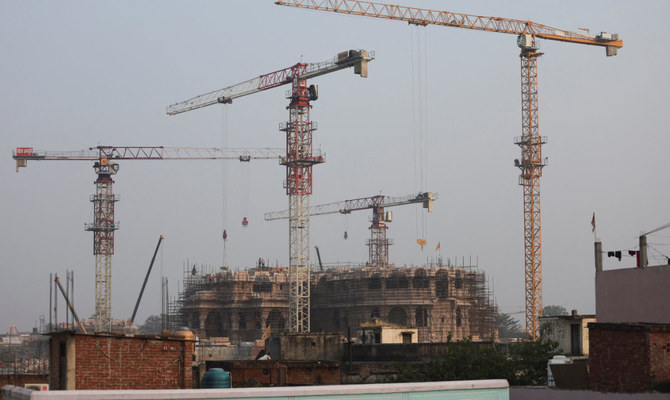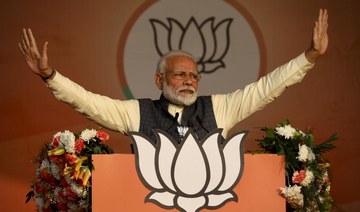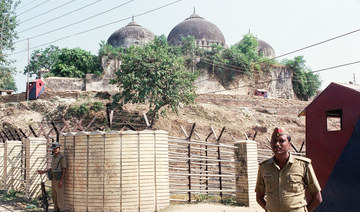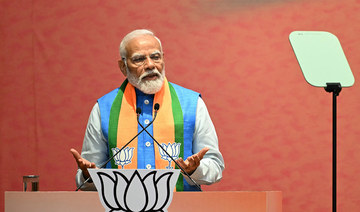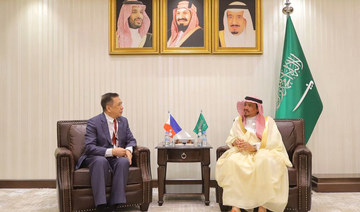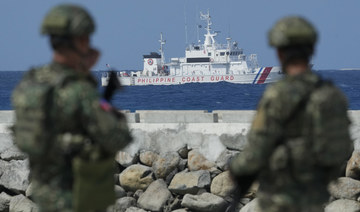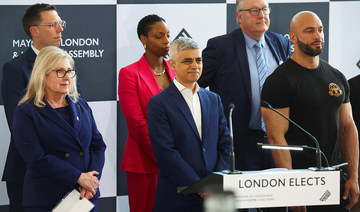AYODHYA, India: In this northern Indian city once marred by communal tensions, laborers are finalizing a $6 billion infrastructure facelift ahead of the opening of a grand Hindu temple that is igniting an economic boom — which some of Ayodhya’s poor and its Muslim community say is passing them by. City officials expect about 4.5 million tourists a month — more than Ayodhya’s entire population of 3 million — once the first stage of Ram Mandir, as the temple is known, opens on Jan. 22 inside a sprawling complex of carved pink sandstone and white marble.
Ayodhya made international headlines in 1992 when a Hindu mob razed Babri mosque — where the Mandir will stand — saying it had been built on the site of an earlier Hindu temple. The incident spurred nationwide riots that left 2,000 people dead, most of them Muslims.
After decades of legal contests, India’s Supreme Court in 2019 awarded the site to Hindu groups for temple construction.
While the $180 million temple project in Uttar Pradesh state is funded by donations, the state government — controlled by Prime Minister Narendra Modi’s Hindu nationalist Bharatiya Janata Party (BJP) — is pulling out all the stops. The BJP — which had made construction of the temple a national campaign pledge — is in government spending billions on rebuilding Ayodhya, with a new international airport, parks, roads and bridges in the offing.
Hindu priest Rajendra Das says the temple — which believers say is built on the birthplace of Lord Ram, one of Hinduism’s most sacred deities — has boosted Ayodhya’s hospitality and real estate sectors like never before.
“Everyone will benefit by the temple,” said Das, a 64-year-old dressed in a dhoti sarong. He is spending $120,000 to rebuild his tourist lodge — which is being demolished in the city’s revamp — with bigger rooms that have more amenities.
“Foreign tourists and people from every nook and corner of India will come.”
Reuters interviewed dozens of residents and businesspeople who said the Mandir is bringing a flood of new investment and prosperity to Ayodyha, though some complain of being left behind. Locals whose property was demolished in redevelopment feel displaced by soaring land prices and scant compensation. And some from the city’s sizeable Muslim community of an estimated 350,000 said they are not reaping the benefits of the boom.
BJP spokesperson Rakesh Tripathi denied that Muslim residents were being left out: “If roads are getting widened then Muslims will also use them. If electricity supply is getting fixed, Muslims will also benefit.”
The opening comes before a national election due next year that Modi is widely favored to win, and will boost the Hindu-first agenda of the BJP.
Hospitality groups and property developers see significant opportunity in Ayodhya, which is set to become a pilgrimage destination for India’s 1.1 billion Hindus. Among many new hoteliers in Ayodhya are India’s Tata Group and US group Radisson, which is setting up an 80-room property. The House of Abhinandan Lodha is also developing a residential project with a spa and pool in a city once lined with open sewers.
“This temple is expected to stand as one of the grandest Hindu temples, much like India’s own Vatican City,” said Lodha chief executive Samujjwal Ghosh, adding that businesses were marketing Ayodyha as a premium consumer product.
Each year, millions of Hindus travel to Indian temple cities like Varanasi and Tirupati, which have become tourist hotspots with thriving hospitality sectors.
Tata’s hotel subsidiary said the Ayodhya projects were part of plans to “strengthen its presence across spiritual centers.” Radisson didn’t return a request for comment on its plans.
SOARING LAND RATES, DEVELOPMENT VICTIMS
Since the 2019 Supreme Court ruling, the cost of land in Ayodhya has soared.
The average price was about 1,600 rupees ($19) per square foot just a few years ago, but has now roughly quadrupled in many parts of the city, according to real estate consultancy Anarock. Plots of prime land in the Lodha project go for 12,000 rupees per square foot.
People “see Ayodhya as a very small town and come with a mindset of getting land parcels at prices of peanuts,” said Satyendra Singh, a top official at Ayodhya Development Authority. “They don’t come again once they hear the prices.”
Much the development has occurred on the site of demolished houses and shops in the city center, where the depth of some stores has been reduced to just 2 feet.
Roughly 4,000 shops were partly or fully demolished, but Nand Lal Gupta, an official at an association of local business owners, said the compensation offered was not sufficient.
District Magistrate Nitish Kumar said adequate compensation was offered to every landowner and that “no one in Ayodhya is feeling left out... Everyone is happy and getting benefitted.”
Grocer Arvind Kumar Gupta said his home was partly demolished in the redevelopment this year. The city gave him $1,870, which he says isn’t enough to buy a new property. He now rents accommodation with his family of six.
Authorities are also demolishing the store he has operated for 30 years. A similar new shop will cost roughly $360 a month, multiples of the $12 he has been paying, Gupta said.
“Government should have made arrangements for us. I am wondering what I will do now,” he said.
UPSET MUSLIMS
In November, thousands of devotees, many barefoot, walked in Ayodhya’s dusty streets during a festive day. Outside the Mandir complex, construction work was ongoing even after dusk.
The revamp, however, has upset many in the city’s Muslim community. In its 2019 order, the Supreme Court also said authorities must allocate the Uttar Pradesh Sunni Central Waqf Board, which advocates for Muslim rights, “suitable” land at a “prominent” place to build a new mosque.
The board was issued land 15 miles from the temple, just next to the city border. That effectively means Muslims are excluded from the development boom downtown, said Azam Qadri, president of Ayodhya district committee of the board.
When Reuters visited the site designated for the mosque, there was no construction or infrastructure development ongoing in the quiet surrounding area. A poster on a wall showcased the proposed design and read: “A Masterpiece In Making.”
“Everyone is focused on the temple. There should have been focus on promoting mosques too,” Qadri said.
Muslims still don’t have wide acceptance in the city and even if the community tried to build hotels, Hindu religious tourists might not visit, he added.
That hasn’t stopped others trying to cash in.
Anil Agarwal’s family has run two small hotels in Ayodhya for 70 years and is now adding two bed-and-breakfasts. He is also creating holiday packages for tourists and is in talks with the city government to open an 18-hole sand golf course.
Near Ram Mandir, a 200-room palace of the local royal family is set to be converted into a hotel by India’s Oberoi Group, a person with direct knowledge of the deal said. Oberoi, famous for luxury hotels, did not respond to a request for comment.
UAE’s Lulu Group is firming up land for a 300-room, five-star property it will run with a hotel brand, said regional director Jayakumar Gangadharan.
“People from all over the world are looking to experience Ayodhya,” he said.



